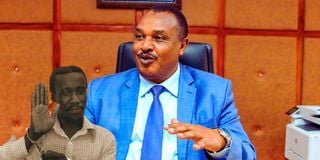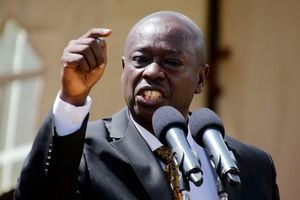
On the night of August 1 1982, Lieutenant Adan Mulata (in blue), an air force pilot, and his friends stopped by a pre-wedding event at the Sports Pavilion in Moi Air Base, Eastleigh. Then all hell broke loose.
The 1982 August coup leader Hezekiah Ochuka had ordered his execution by firing squad after he declined to fly a helicopter on the fateful day.
Lieutenant General Adan Mulata, who retired in 2022, had initially narrowly escaped death when a corporal who had jumped in front of them in an attempt to dissuade the mutineers was shot using a sub machine gun and his brains splattered on him.
The victim was to be the first casualty of the August 1 1982 coup attempt that was later crashed by the Kenya Army personnel by 10am.
It had been an uneventful Saturday for Mulata, then a young, budding lieutenant.
He had visited his friends in Eastleigh and returned to the Moi Air Base Officers’ Mess in midafternoon to find his fellow pilots who had just returned from a joint military exercise in Turkana.
Mulata recalls joining them in a chat and merry making until at about 7:30pm when he left with the intention of going back to spend the weekend with friends in Eastleigh.
He found a Captain Njoroge about to be driven to his Southlands home at the parking and requested for a ride to the gate.
Just then a colleague of his, Captain Wachira, who was the Operations duty officer came along and also requested to be dropped at the Air Force Operations room.
After dropping off Captain Wachira at the Ops room, then Lieutenant Mulata, Captain Njoroge and the driver proceeded towards the airbase’s gate but encountered a pre-wedding event at the Sports Pavilion and decided to pop in.
As they were leaving, the trio was confronted by five heavily armed soldiers in combat gear and ordered them back into the hall.
Unknown to them, the coup had begun.
“When we were leaving the hall, we met about five heavily armed soldiers who blocked us from leaving. A corporal ran out of the hall past us and was shouting at the armed soldiers telling them that whatever they were doing would not succeed. One of the armed men opened sub machine gun fire on him blowing up his head as he watched. Blood and brain matter splashed on me,” the retired officer recalls.
Panic and tension
It is then that they realised that they had been caught up in a mutiny. The armed soldiers locked everyone in the hall and took positions in trenches that had been dug for a squash court.
There was panic and tension at Moi Air Base as junior officers involved in the coup accorded themselves senior ranks and harassed their seniors.
When Mulata attempted to go to the Officers Mess later in the night to join his colleagues, his juniors sprayed the adjacent wall with bullets to scare him back into the hall.
For eight hours, they were locked up in the Sport Pavilion with both soldiers, officers and civilians not knowing what fate held for them.
At about 4:30 am the mutineers started distributing guns and other weapons to everyone in the hall but Mulata declined to take up one insisting that he was an officer.
Elsewhere, some other senior officers who had been intimidated took the guns.
At some point, Mulata being a commissioned officer threatened the soldiers that he was going to lock them up in the guard room.
It was then that the soldiers ordered the officers to go join their colleagues at the Officers’ Mess. He and Captain Njoroge walked to the mess but as they were approaching, they noticed their colleagues huddled on the stairs guarded by armed soldiers.
“As we approached the Officers’ Mess I heard my colleagues says ‘that is one of them’. And even before I got to the stairs, we were bundled into a waiting Land Rover and driven to the Helicopter Squadron. The soldiers had sub machineguns with bullets strapped around their bodies. They wanted us to fly to Kahawa, Embakasi and Langata barracks for them to see what was going on,” the officer says.
At the helicopter squadron, even when the soldiers offered to shoot padlocks to the lockers where he kept his flying kit, Mulata declined to fly forcing them to take him to Ochuka who had set up his command base at the KAF operation Centre.
It was at about 9:30am at the time and other groups that Ochuka had expected to join them had not. Kenya Army had started regaining control of the areas besieged by their Air Force counterparts.
There was chaos and confusion in the Operations Centre where many junior soldiers mostly corporals who had accorded themselves higher ranks were huddled together.
Ochuka subdued
Ochuka, to whom it had downed that the coup was falling apart was surrounded by his accomplices as they received news that Kenya Army soldiers were on the brink of reclaiming Kenya Broadcasting Corporation (KBC) studios from where they would then go to the Eastleigh Air Base.
He was a man being overwhelmed by the magnitude of the humongous task he had taken up.
“We were taken to the Operation centre where Ochuka was stationed. There were many junior officers who had elevated themselves to senior ranks. He looked overwhelmed and didn’t even look at us for long. When I was presented before him by corporal Ngatia and he was informed that I had declined to fly, he looked at me and casually said that if I had refused to fly then I should be executed.”
They walked out of the operations centre, from Ochuka’s presence and one of the soldiers who had been ordered to shoot him identified as Corporal Sepalan, now deceased, let him live.
“Afande (senior officer) Mulata, you are free to go,” the corporal said.
Concerned, Lt Mulata asked Cpl Sepalan (donned in captains rank), if he wanted him to turn his back so that he shoots him from behind, but the junior officer confessed that he could not bring himself to shoot him.
Luckily for Mulata, as he was walking away he noticed Kenya Army soldiers frog marching his colleagues from the ‘married quarters’ towards the mess. He too was taken with other officers and held in confined space which was previously a TV room for two weeks as they waiting for vetting.
For two weeks, over fifty KAF officers were bundled into a 20-by-10 room where they slept on the hard concrete floor for the whole duration of vetting.
Whether one was involved or not, the whole group was subjected to humiliation and fed half cooked rice.
All this time, they were never allowed to take a bath and only given time for brief ablution breaks.
Active participants in the coup were taken to Kamiti Maximum Security Prison while those suspected of having been involved or there was uncertainty on their participation were dismissed from the Air Force.
During his brief interrogation and vetting by a task force, the interviewers surprised by his defiance of the mutineers asked him if he was’ that brave or was just stupid’ to defy the orders that he had been given by the coup leaders.
Those deemed innocent were retained, following further interviewing we taken on board to re-establish the Kenya Air Force under a new name ’82 Air Force’ which was declared in early 1990s as unlawful.
Lt Gen Mulata is among the few who were retained and continued to serve in the KAF until his retirement, 30 June 2022.









